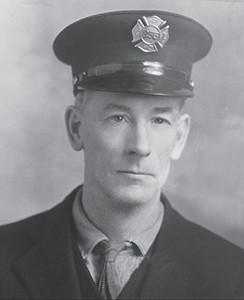
William S. Junkin, a leader of the 1917 strike in support of telephone operators, retired in 1930 as an employee of the Fire Department in Portland, OR. City of Portland (OR) Archives, A2006-004.1325
In 1917, just as the United States was entering the great European war, the hello girls at PT&T once again tried to organize a union. Once again the linemen of PT&T mobilized to support them, which one again put them in conflict with their International officers.
In a referendum, telephone linemen authorized a strike if PT&T didn’t recognize the telephone operators’ union. But Grand President Frank McNulty called off the strike to give a federal mediator more time to work out a solution. PT&T insisted that it would never recognize the telephone operators’ union. Federal mediator Verner Z. Reed threatened to “commandeer” PT&T’s property in the name of national security unless progress was made toward a labor agreement.
IBEW locals in California agreed to delay their strike, but locals in Oregon and Washington walked out on October 31, 1917. McNulty threatened to revoke their charters if they didn’t return to work.
On November 15, a mediation commission headed by U.S. Labor Secretary William Wilson proposed a settlement and invited the Oregon and Washington strikers to come to San Francisco to talk it over. As their representative, the strikers sent William S. Junkin, who had led the 1913 PG&E strike. Under pressure from the strikers as well as the mediation panel, PT&T capitulated and recognized the telephone operators union as a part of the IBEW. Operators, linemen and other classifications got wage increases.